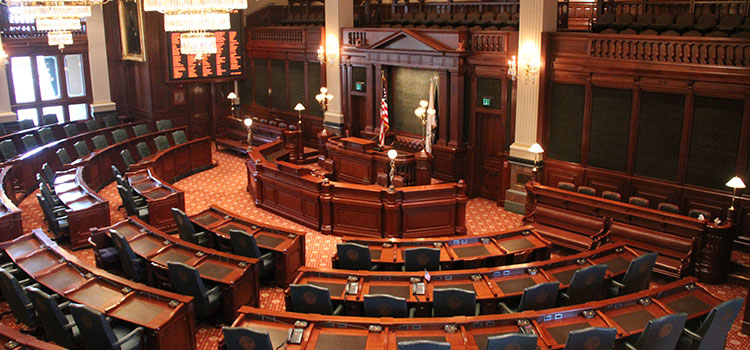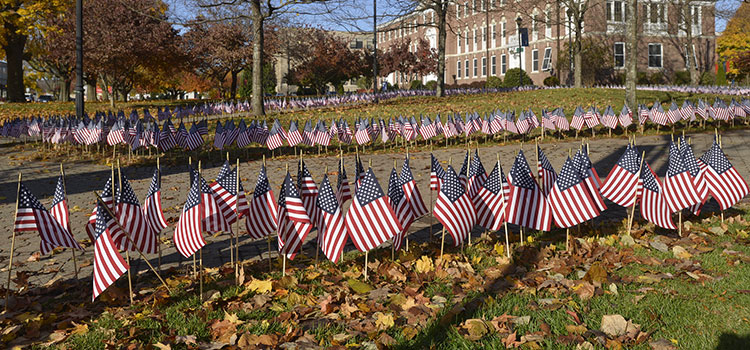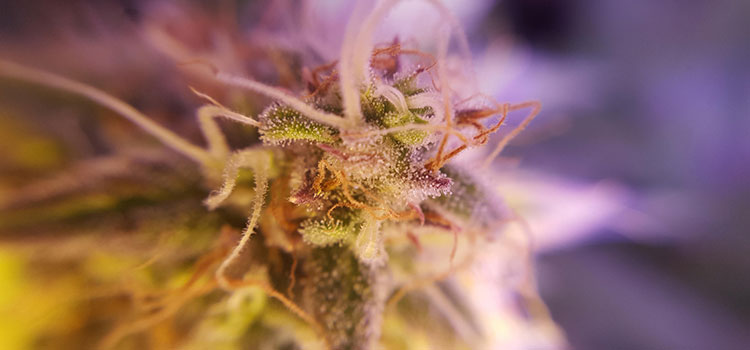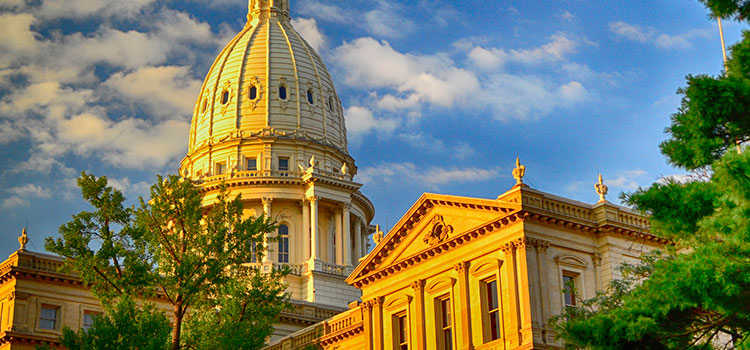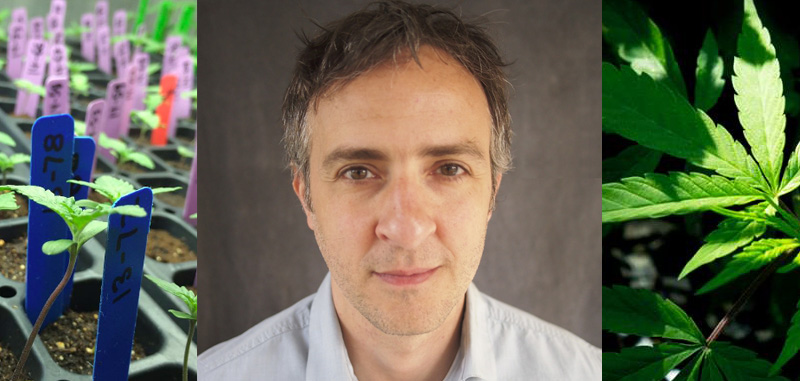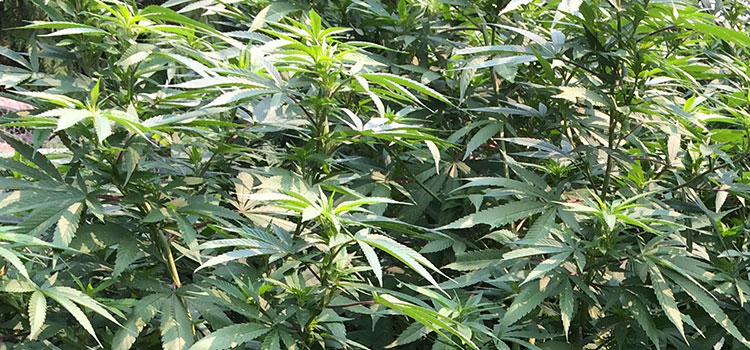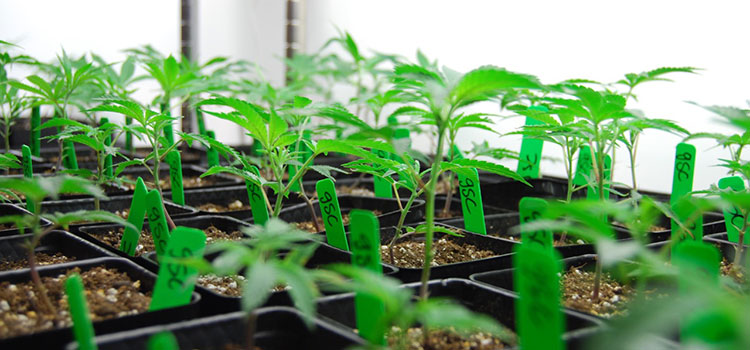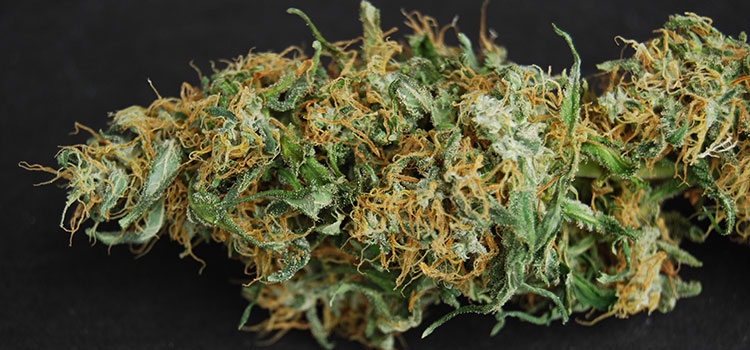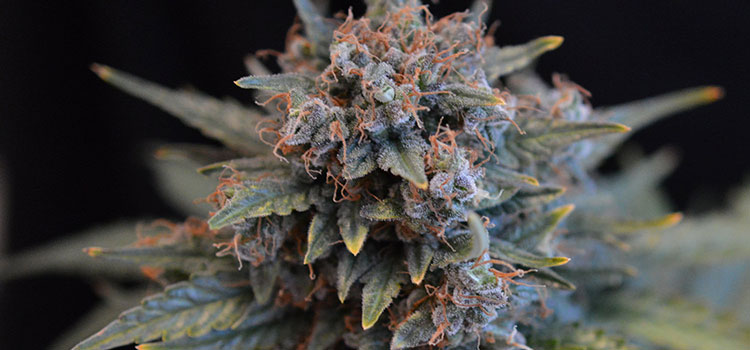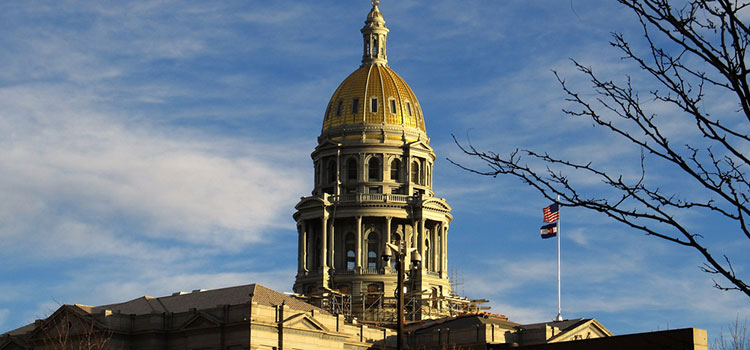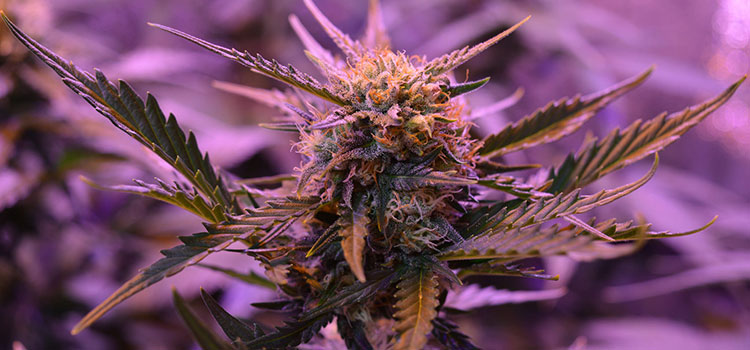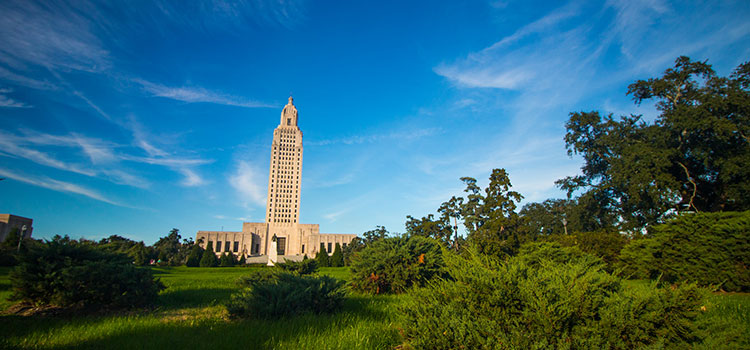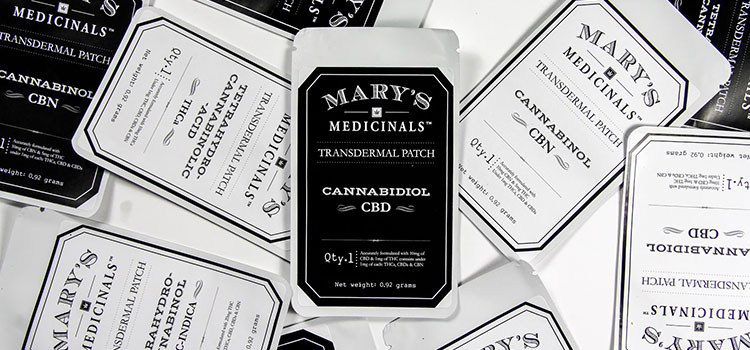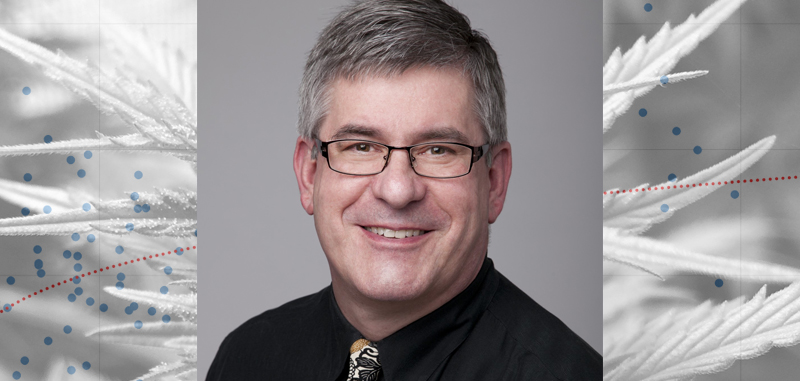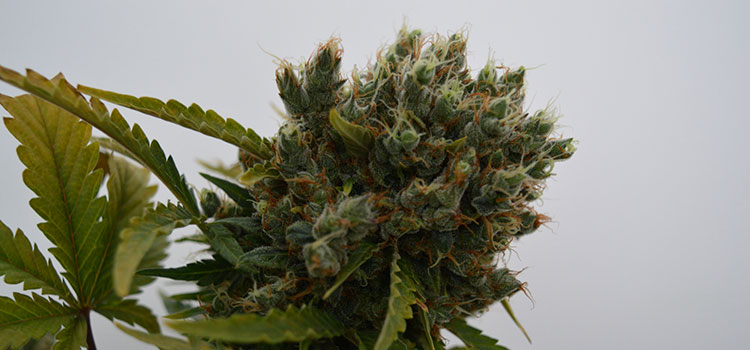Mowgli Holmes is the co-founder and Chief Science Officer of Phylos Bioscience, a cannabis genomics firm whose mission includes telling the evolutionary story of the cannabis plant. Mowgli recently joined our podcast host Shango Los for a discussion of what his research has uncovered to date, how long ago humans began to cultivate cannabis, how Phylos Bioscience is building a 3D map of cannabis genomics, and more. Listen to the full interview below, or scroll down for the transcript!
Subscribe to the Ganjapreneur podcast on iTunes, Stitcher, SoundCloud or Google Play.
Listen to the podcast:
Read the transcript:
Shango Los: Hi there, and welcome to the Ganjapreneur.com podcast. I am your host, Shango Los. The Ganjapreneur.com podcast gives us an opportunity to speak directly to entrepreneurs, cannabis growers, product developers, and cannabis medicine researchers, all focused on making the most of cannabis normalization. As your host, I do my best to bring you original cannabis industry ideas that will ignite your own entrepreneurial spark and give you actionable information to improve your business strategy and improve your health and the health of cannabis patients everywhere.
Today my guest is Mowgli Holmes, co-founder and chief science officer of Phylos Bioscience. Mowgli is a molecular and evolutionary biologist. He has a PhD from Columbia University, where he was a National Research Service Award fellow. He’s a founding board member of the Cannabis Safety Institute and the Open Cannabis Project, and is a chair of the Oregon State Cannabis Research Task Force.
Mowgli and his team and Phylos are focused on mapping the cannabis plant family tree. They have created a 3D map of the cannabis genetic family in order to better understand the traits of individual cultivars and empower us to create crosses that can provide targeted relief to humans.
Welcome to the show, Mowgli.
Mowgli: Thank you, Shango.
Shango Los: To get us started, in order to get a snapshot of the timeline that we’re going to be discussing today, what’s the farthest back that we can claim that humans knew about the cannabis plant and at what point can we show evidence that humans were trying to domesticate the plant by some sort of intentional relationship with it?
Mowgli Holmes: All of the evidence that we have points to cannabis being domesticated right when we first domesticated any plants, which is about 10,000 years ago. We think that the first origin of domesticated cannabis was, you know, somewhere between 8 and 10,000 years ago, somewhere in Central Asia. The oldest actual sample that we have is a 2,700 year old sample that was discovered in a shaman’s tomb that was dug up in the Gobi Desert.
Shango Los: How do you go about getting this kind of material? I’m sure that with some of the hybrid stuff that’s happening modern, you can ask friends or go to a dispensary, but how do you get your hands on cannabis from a shaman’s tomb?
Mowgli Holmes: I mean, for us, the collection process has been so fascinating and difficult and complicated, and there’s all these different layers of historical sample. You know, we’ve got a lot of modern dispensary stuff, and then we’ve got a lot of second and third gen hybrids that we’ve collected by just reaching out to our broader network of connections in the cannabis industry and tracking down old breeders and collectors and just collecting really all over the world and having our partner labs in different states and even different countries extract DNA for us. We’ve got samples of the early first gen hybrids, which were the first time that people ever crossed land races together, the classics like Maui Wowie and Panama Red and Kona Gold. Those are some of the oldest ones that we have that are hybrids.
Then, going back and going to lots of other countries, I think we have samples from 16 different countries now. We’ve been able to collect a lot of land races, but then getting the really old stuff has been a process of working through our museum connections and reaching out … at the big plant museum collections where people have dried plant material that has been preserved for hundreds and hundreds of years. That particular old sample from China right now is in the Turpan Museum. We’ve been trying for a year and a half to get ahold of it.
We know some of the people who were on the paper that first described it. One of our collectors travels to China regularly. We think we’ll have a sample in the next few months. It’s very difficult coordinating international exchange of samples that until you extract the DNA are illegal, with people in Northern China. Many of them don’t speak English. It’s just a very complicated process. That sample is sitting there. In fact, there’s a little bit of DNA from it in the archive at GW Pharmaceuticals. That’s another potential avenue that we’re working on.
Shango Los: I can imagine how helpful the museum has been to give your project some more cred in trying to get a sample like that from China. I know that I’m really showing my hand as being a genetics novice with this next question, but those genetics are so old, are they still viable or do they break down and degrade with time? I don’t know how much I’ve learned from Jurassic Park is real, right?
Mowgli Holmes: Yeah, I mean, basically dry material can never produce living material with plants. There’s just no way. The slightest bit of living tissue could, in theory, be coaxed into a new plant, though honestly a lot of things need to be done correctly for that to work. If you go into even a dispensary and you get some stuff that was cured last week, it’s dead. It’s not going to grow. All we can do is analyze the DNA. We’re never going to be able to grow those plants. It’s the same with dinosaurs. You find fragments of their bones or whatever and you can often get DNA and analyze the DNA, but you’re not going to grow a live dinosaur.
Shango Los: Yeah, much to most everybody’s disappointment.
Mowgli Holmes: I know. People keep asking us to bring back Panama Red with some kind of Jurassic Park-style technology. I don’t think it’s in the cards.
Shango Los: All right, so that was looking backwards. You’re gathering these samples that are ancient through your museum relationships, and the stuff that’s several decades old you’re getting from different collectors and secret friends around the world who have kept them reliable. Then, of course, the modern hybrid stuff is pretty easy to get. Now, these seeds and these genetics all somehow tend to find their way to Northern California, right, where they thrive and are crossed and recrossed. If I understand how your mapping project works correctly, you actually have to unravel these crosses so that you can plot them out into your beautiful 3D graph. To what extent is it even possible to unravel the crazy soup of crosses and recrosses that are sitting in Northern California so that you can make sense of it?
Mowgli Holmes: I mean, it’s a scientific parable, it really is. I mean, the galaxy, our map of the cannabis population, I mean, if you played with it, you know it is a very tangled structure. That is the structure. That structure in the galaxy doesn’t represent any untangling of the actual structure. That is the tangled structure right there. As we start to fill in more and more samples, as we fill in more older, interesting, land raise type samples, I think some more clarity will be added. As we fill in more modern samples, it’ll just get messier and denser because each position in the galaxy is the actual genetic position that it has. When you have complicated back-crossing and selfing and hybridization, you end up with these weird clusters. We positioned all those dots in the correct relationship to each other in genetic space as well as can be done. The mess that you see there reflects the actuality of how tangled and confusing the population is. It’s just complicated.
As you go back in time, things will clarify. Pretty soon, we’ll be able to tell people things like, “Your sample is 30% Thai and 15% Colombian heritage.” It’s just like what 23andMe does for humans. If you go to 23andMe, you can order a genetic testing kit and then they’ll sequence your DNA and they’ll do an analysis very much like we do and they’ll tell you, “Your ancestry is 15% Native American and 5% Dutch. Your grandfather who told you that he was from Holland was actually from Namibia, sorry.” People find out all this interesting stuff. We’re using a lot of similar technology, so we’ll be able to tell people a lot of similar things about their plants.
Shango Los: Let’s nerd out on the galaxy tool for a minute. Most of the listeners probably have not seen it yet, and to my novice eyes what it looks like is this beautiful computer rendered 3D architecture that you can move around and focus in on and come back out and it creates a data space that shows the relationships of all of these different genetics. In what way, as a scientist, does it help you to be able to visualize this as a 3D tool instead of just doing it the traditional way with paperwork?
Mowgli Holmes: Right, well so that tool is actually just a super fancy version of what population geneticists actually used. Lots of people have asked us why it’s not a tree. It turns out that trees show branching separation. The branches branch and separate from each other, and that is a good picture of how species separate. Then, when they can’t inter-mate anymore, they go off on their own branches and they’re separate forever and they keep branching. Evolutionary trees show a lot of different species. If you have one species that can hybridize, you get lines across all those branches and it becomes a network instead of a tree. Population geneticists who want to map out the relationships of a bunch of humans or a bunch of dogs or a bunch of tulips or any one species, they don’t use trees. They use a network or they use clustering tools like we’ve used.
The state of the art in population genetics for looking at a population is a tool called PCA, or principal component analysis, that gives you this scattered plot where you see all these little dots and you can kind of see how they’re positioned with respect to each other. Usually, those are done in two dimensions, but you can project them into three dimensions and you get more information. People have done that. People have also made those network lines that you see on the galaxy, which is a different way of looking at the relationships. No one’s ever combined them, and no one’s ever made it three dimensional and made it interactive. We just took those basic tools from population genetics and we tried to make a version that was fun for normal people to play with. If it was any other subject, it’d be too science-y for people to deal with, but because it’s cannabis and because breeders and growers care so much about the history of this plant, I actually think it’s going to be one of the first times that non-scientists have been able to really geek out on genetics because this is a community that cares about genetics.
Shango Los: You know, they say that cannabis is the gateway to horticulture. Maybe now, because of the technology, cannabis is becoming the gateway to genetics for folks too because you’re right, people care about this plant like none other. One more question before we go to the break, you mentioned a scatter plot. I’ve seen scatter plots when they’re comparing or relating many different species and you say that we are looking at one species that’s been cross-hybridized with itself so many times. What would the scatter plot look like for cannabis? Would it all be scattered so close together that it’d make a single blob in the middle of the page because it’s also hybridized?
Mowgli Holmes: Well, the galaxy is the scatter plot, it’s just stretched into three dimensions. Imagine if you compressed it into two dimensions. It would be messier, but because it’s three dimensions, you can spin it around and look at it from different angles. That is the scatter plot. It’s just presented in a way that makes it so you can actually climb around inside of it.
One thing that I should say is that people have … It’s just a fancy version of, like I said, of tools that population geneticists use. We’re already talking to people about using it for cocoa, sorry, I mean cacao and coffee varieties, and we just talked with a group from Stanford that has done a population genetics study of a whole human population. They’re going to use the galaxy to visualize their data, because it’s just a good tool for looking at how populations are structured.
Shango Los: Right on. Cool. Well, when we get back from the commercial break, we’re going to talk about some of the commercial applications of this. You are listening to the Ganjapreneur.com podcast.
As a cannabis entrepreneur, you know how challenging recruiting quality talent can be. Your day’s already busy enough, and yet there is an ever growing pile of resumes on your desk and your team is begging you to hire more help. Hiring the right person can make a profound impact on your company. There’s no reason that you have to suddenly be an expert hiring manager, not when there is Viridian Staffing. Viridian Staffing recruits solely for adult use cannabis, medical marijuana, and hemp companies and those that service them.
Viridian Staffing’s recruiters each have over ten years of experience, and they will use that experience to recruit the kind of employees that will make you look good. Whether you’re looking for a master grower, extractor, grow room support, or trimming, Viridian can find an appropriate person in your area. They can even recruit administrative or graphic design professionals who may not need cannabis experience. Because you are a startup, you may also need human resources help for a while. Viridian Staffing can make sure that your HR files are complete and keep you out of trouble with state and federal employment requirements. Because the cannabis industry is booming, cannabis recruiting companies are popping up all over the country, but good marketing does not mean good recruiting. Some of the recruiting shops that have opened are run by novices who do not yet have a thorough understanding of employment law and the complexities of hiring for cannabis. Don’t hire an amateur to find you a professional. Consider Viridian Staffing to make that stack of resumes disappear and complete your team with exactly the hire you were hoping for. You can find out more at ViridianStaffing.com. That’s V-I-R-I-D-I-A-N Staffing.com.
Now, back to the show.
Welcome back. You are listening to the Ganjapreneur.com podcast. I’m your host, Shango Los and our guest this week is Mowgli Holmes, co-founded and chief science officer and Phylos Bioscience.
Right before the break, we were talking about how some of these different industries are excited about using your 3D mapping tool, the galaxy, for whatever industry they’re working in. Let’s riff a little bit on some of the commercial applications across the board for the family tree of cannabis that you’re putting together. The first thing that jumps to mind is intellectual property. We had Reggie Gaudino from Steep Hill on the show, I don’t know, maybe eight weeks ago, talking about how for breeders, they’re going to have to get to an F9 in order to patent something with the federal government when that time comes. It seems to me that your family tree is going to be really useful for all types of breeders who are going to want to show their place on the tree and therefore try to own it with a patent and then license it. Is that an accurate understanding?
Mowgli Holmes: I think some people see it like that, but we don’t see it like that.
Shango Los: All right, how do you see it, then?
Mowgli Holmes: Right now, the conversation about IP and patents in the world of cannabis is heating up in a big way, and people are really striking around, trying to figure out what to do about it. Me and Reggie have taken very different approaches to how to deal with it, but I actually got to see Reggie last week and we spent a few hours talking about it. Our approaches aren’t as different as we thought they were, but they are a little different.
We actually see the galaxy as a tool to block plant patents, rather than to enable them. What everybody’s worried about is the coming invasion of big ag and the potential threat from them patenting lots of stuff and maybe restricting access to it. Reggie’s approach was let’s get your stuff sequenced and people can try to patent their own stuff and then Big Ag won’t be able to patent it or grow it. Our approach was let’s get all this old stuff sequenced and use that as proof that it’s in the public domain so that no one can ever patent it. Those are two different and valid approaches. Our feeling is that plant patents aren’t going to be a good tool in this industry.
First of all, all of this old stuff is in the public domain, it has to be. Legally, it is in the public domain. If stuff has been circulating and is so old, it cannot be patented. We’re giving all of the data that we can give to a nonprofit that we’ve been working with called the Open Cannabis Project. They’re just going to sort of keep track of the database and make sure that all of the existing strains have some evidence showing that they’re in the public domain, they’ve been sold and they’ve been circulated, and therefore, according to patent law, they can’t be patented. Only brand new things that haven’t been sold, ever, can be patented. That wouldn’t stop someone from coming in and taking something old and renaming it and pretending it was new and trying to patent it, because no one’s been watching cannabis. USPTO has not been watching it. There’s no proof that things are in the public domain. We wanted to use all of the sequence data as proof that things are in the public domain. We got a lot of push back, especially from Northern California, because a lot of growers said, “Well, I want to patent my stuff.” Our answer to that has been, “If it’s old or you sold it, you can’t patent it. If you make something new, that’s a different story.”
Right now, the government’s not supporting cannabis patents, though it looks like they may start to. They granted one utility patent already, and they may start to grant plant patents. Our general position has been that everyone needs to accept that the stuff that’s out there now can’t be patented and we should be fighting to make sure it’s in the public domain and no one tries to patent it illegally. Then, going forward, we do want breeders to find a way to get paid because they’ve done incredible work and we want them to keep doing incredible work. But there is no structure that protects them right now, and we don’t know how to solve that problem, but we do think that plant patents won’t be the way to do it because plant patents are expensive and difficult to get and hard to defend and don’t work well in fast moving, innovative industries like this. They generally favor big corporations and they do not generally turn out to be a tool for little guys. That’s our feeling. We feel like people should keep their brand new stuff proprietary, hold it close, and as a community we should figure out how to support breeders in getting licensing fees and royalties. It’s a really, really tough question, and I don’t think the USPTO’s going to be the answer for the community, but we’ll see.
Shango Los: I got to say that I’m surprised and actually pretty stoked by your answer, because I came into this interview expecting you to say that, “Yes, we are making this key to the past of cannabis genetics,” and because of that, you’re creating the bed for Big Ag and Big Pharma to come in and patent these genetics because they will be able to do so faster than every man, and to build on that. It’s true, you know, anything that already exists and is being sold can’t be patented because it’s already out in a market. This leads me to the question of, what if you were to take two, say, land races and cross those and let’s say that was done for the first time by a pharmaceutical company, would they then use the galaxy to show that this cross doesn’t exist, and then their hope would be then to use that evidence that their cross is unique and therefore could be patented? Is that how the exercise is thought through?
Mowgli Holmes: The existing apparatus for patenting plants is there’s a big existing structure in place. You can get three different kids of IP protection over plants. There’s enforcement, there’s regulation. Once all those things come into play for cannabis, if they do, the galaxy won’t be part of that. In fact, you can use DNA sequences to prove that something has been around and is in the public domain, but you’ve never had to use DNA sequences in order to patent things because we never had them before. It’s a bunch of different criteria that Big Ag uses to patent plants.
We don’t think the galaxy will be a useful tool to help little guys patent things or big companies patent things. If anybody makes a brand new cross and can prove that it is truly unique and different and novel, and if they want plant variety protection, they need to prove that it’s true breeding, if they can prove all those things then, in theory, they can get a patent if the USPTO’s willing to grant that kind of patent. They wouldn’t need the galaxy at all. The galaxy is really a tool for the industry to see what they have and understand where things came from and really, ultimately, identify what they’re selling to people. Right now, there’s total confusion in the strain naming world, and if you look at the galaxy, there’s one big cluster of Girl Scout cookies and varieties, but there’s a bunch of other Girl Scout cookies all over the galaxy, they’re in different places, so by definition they’re genetically distinct. Which one is the real one? It’s answering those kind of questions, which we hope to be able to do with the galaxy so that in the future rec users and medical patients can get the same stuff over and over and over, instead of wandering into dispensaries and getting something different every time. It’s really much more a tool to bring consistency and knowledge to the industry than to help people with their IP issues.
Shango Los: Right on. I’ve got one more question on this kind of corporate science topic, before we move on to some real world medical applications for your technology. That is, we did a show a while back where Tyler Marquardt made the case for GMO cannabis. I’m sure that the genetic insertion folks are kind of beside themselves, excited to get their hands on the galaxy to help them figure out where they want to work. What are your thoughts on genetic insertion GMO?
Mowgli Holmes: Yeah, so again, the galaxy is not a good tool for that. I mean, if you asked a scientist, they would tell you. What you need to do genetic modification is a big, detailed, annotated version of the entire cannabis genome. A lot of groups, including us, are working on that and we do want to make that public. That would be the public resource that would help people understand genes and help with breeding, and it would also help people do genetic modification. We don’t support that. We don’t support most of the things that big ag companies do in terms of agriculture. We don’t like pesticide use, we don’t like monoculture, we don’t like restrictive plant patents, and we definitely don’t think that the cannabis community wants GMO cannabis. We think that modern plant breeding tools actually are so powerful that you can make naturally bred plants with whatever traits you want, without cutting and splicing genes back and forth. I think breeding is the way to make new plants, and I think that if people start doing GMO cannabis, it’s going to be … I just don’t think this community wants that. I think we really want plants to be bred naturally.
Shango Los: Right on. Cool. We’re going to take one more commercial break. When we get back, we’re going to talk a little bit more about breeding for specific treatment of ailments. We’ll be right back. You are listening to the Ganjapreneur.com podcast.
The Ganjapreneur.com podcast is listened to by tens of thousands of cannabis entrepreneurs and enthusiasts every single week. These folks are most likely your target customers, and we’d like to introduce you to each other. Our down to earth and information rich commercial breaks can deliver your message to the cannabis business community and others who just find relief in getting high.
If you want to reach out and connect with our audience in the most personal way that we can offer, go ahead and drop us an email at grow@ganjapreneur.com, and we can talk about you becoming a commercial sponsor of the podcast. Thanks for listening and being part of the Ganjapreneur family. Now back to the show.
Welcome back. You are listening to the Ganjapreneur.com podcast. I’m your host, Shango Los, and our guest this week is Mowgli Holmes, co-founder and chief science officer at Phylos Bioscience.
The part that I want to end with is how the 3D galaxy map of the cannabis family tree is going to help real people. This show is really in favor of patients’ rights and the medical applications of cannabis, all the way to believing that recreational cannabis is actually medical cannabis, because it’s giving stressed out people the opportunity to get some relief from that stress.
Mowgli Holmes: Yeah, absolutely.
Shango Los: What you’re building is this beautiful thing. The galaxy is beautiful to see, it traces the genetics over history, and it’s got me thinking that there just has to be ways to apply that knowledge looking forward, putting it in the hands of breeders so that they can develop specific cultivars to address particular ailments. Is it going to be useful for breeders to do that?
Mowgli Holmes: It will be. It’s funny, I don’t want to downplay the galaxy, I think it’s a great tool, but you asked me if it would be useful for IP and I said, “Well, it’s not really good for that.” Would it be useful for genetic studies or genetic manipulations? It’s not really good for that. At the moment, it’s not really a tool for breeders either. The main thing it’s a tool for, like I said, is knowledge and bringing consistency to the industry so people can finally start to know what they’re getting. It will evolve into a tool that’s good for breeders because as we start to be able to add trait data, you can imagine a THC or a CBD heat map superimposed on the galaxy. We have lots of other kinds of data we’re going to roll out. You’ll be able to click on individual nodes and see chemical metadata for them and location data and we’ll have a geographic view showing where things came from. All of that stuff will let readers make intelligent choices about what parents to pick when they’re looking for new traits or what parents to pick when they want something but don’t have it and they want to find it nearby. All of those things will help readers.
I mean, really the way that breeding is going to work in the future is that … I mean, there’s a whole set of breeding tools that just go beyond the galaxy, that have to do with sequencing the progeny when you make a cross and looking for the right genes. Once we start to understand what all the different genes are doing, that’s a way that we can help breeders really accelerate their work. I think that’s going to be the future, and that’s what’s going to let us develop the next generation of cannabis varieties. I think the galaxy will be part of that, but it’s really a whole other set of technologies in addition that have to be rolled out. It all depends on really understanding the genome. The galaxy lets us understand the relationships, but it’s another layer of work to understand what each of the genes are doing.
We’re about to be operating under an Oregon state cannabis research license that will let us work with unlimited plant counts to do basic genetic research. We’re about to be able to start tracking down those genetic pathways. Where are the genes for pest resistance? What are the terpene metabolism pathways? Pretty soon we’ll know that stuff.
Shango Los: You know, coming into this interview, I actually thought that by simply doing the map that you’re doing that you can see those genetics as part of that process and would know them, but now I’m realizing from so many things you’re telling me that what the map is not, that actually it’s a really huge second step. The first step is yeah, we’re going to map it, and now we see the family tree, but now we have to figure out what these genetics actually do. Where is the particular genetic for this taste or this result or the one that stops shaking in Parkinson’s? First, you’re going to map the area, and then you have to go in and study what the delineations are, and it’s only at that point that you have something that’s really usable.
Mowgli Holmes: That’s right, that’s really usable for breeding, at least. Yeah, that’s absolutely well put.
Shango Los: Right on. That second step sounds like a hell of a lot more research.
Mowgli Holmes: It’s a lot of work, but I will say that … I mean, it’s scientifically the most fun project you could possibly have because scientists labor away in one little, tiny corner of their fields and there’s always thousands of other people working on everything about every organism, and here’s an organism with almost no research done on it. So much of the next phase of this basic genetic research I’m talking about is going to come so fast because we know how to do this work, we’ve known how to do it for decades, and we just haven’t done it for cannabis yet. It’s just really exciting.
Shango Los: Yeah, totally. I was talking with Robert Clark at Emerald Cup, and we were just joking around and he’s all like, “Man, it’s really great to be a scientist in an industry that people care enough to actually want to talk to you.”
Mowgli Holmes: Yeah, it’s amazing. It’s amazing. It’s a brand new scientific field, and normal people actually care about it. It’s incredible.
Shango Los: Right on. Well, that’s all the time we have for today. Thanks so much for being on the show, Mowgli. I really enjoyed it.
Mowgli Holmes: Yeah, thank you. It was fun. I’ll talk to you soon.
Shango Los: Mowgli Holmes is co-founder and chief science officer at Phylos Bioscience. To find out more, you can go to their website at Phylosbioscience.com. That’s Phylos, P-H-Y-L-O-S Bioscience.com. You can also watch Mowgli’s fabulous slide presentation at Tech Fest Northwest by searching Mowgli Holmes Tech Fest on YouTube.
If you want more info on cannabis genetics, check out our back catalog interviews with Tyler Marquardt, of Allele Seeds, making the case for GMO cannabis, and also Reggie Gaudino, speaking on patenting strains and botanical intellectual property. You can find more episodes of the Ganjapreneur podcast in the podcast section at Ganjapreneur.com and in the Apple iTunes store. On the Ganjapreneur.com website, you will find the latest cannabis news, product reviews, and cannabis jobs updated daily, along with transcriptions of this podcast. You can also download the Ganjapreneur.com app in iTunes and Google Play. For info on me and where I will be speaking, you can go to ShangoLos.com.
Do you have a company that wants to reach our national audience of cannabis enthusiasts? Email grow@ganjapreneur.com to find out how. Today’s show was produced by Michael Rowe. I am your host, Shango Los.

